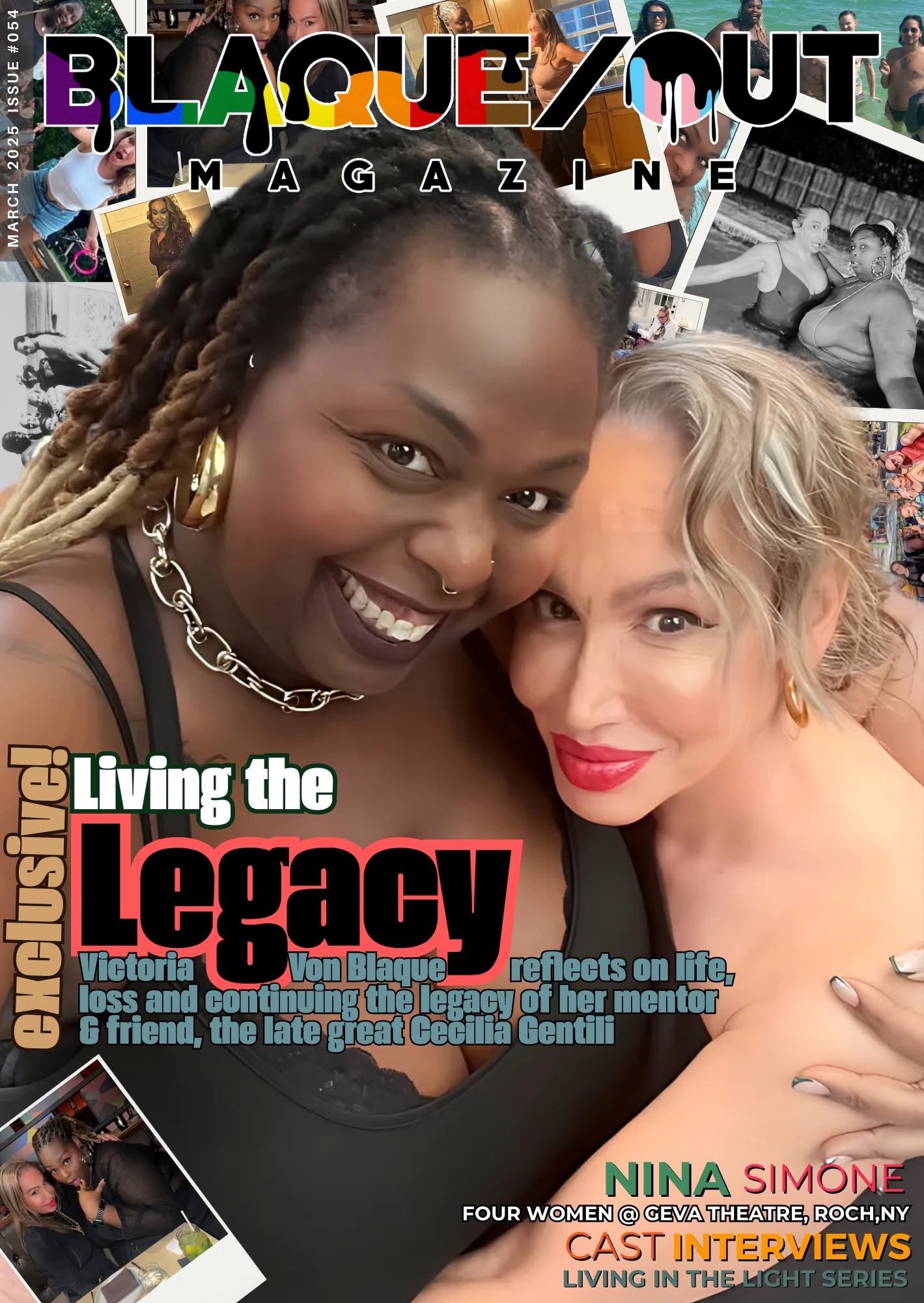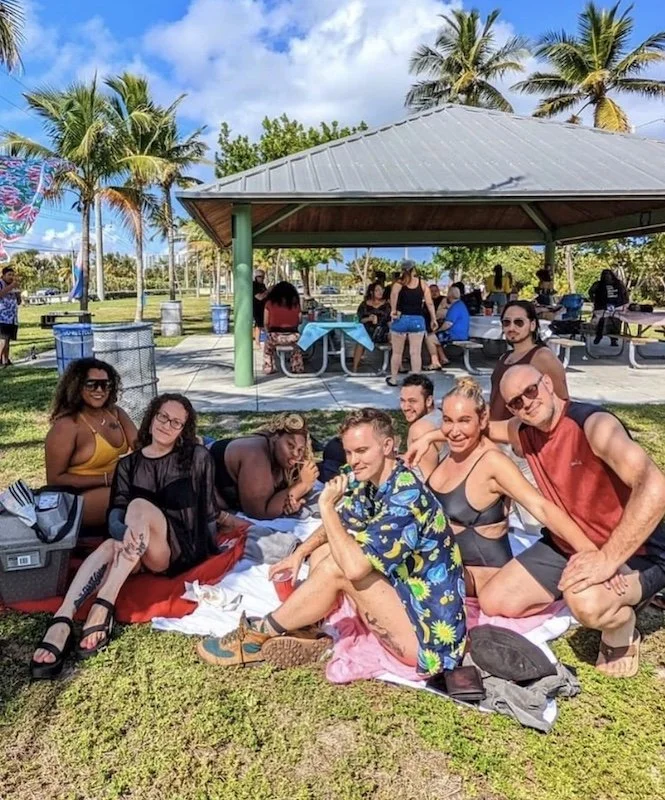LIVING THE LEGACY: Victoria Von Blaque reflects on life, loss and continuing the legacy of her mentor & friend, the late great Cecilia Gentili
Victoria Von Blaque embodies more than just a name within the Transgender and sex worker rights movements, she’s a force of change, compassion, and perseverance. With over twenty years of experience, she has established herself as an advocate, consultant, and performer. Most importantly, she is dedicated to honoring the impactful legacy of her late mentor, Cecilia Gentili.
Cecilia Gentili was a groundbreaking activist who significantly advanced the rights of the transgender and sex work communities, particularly through her efforts to abolish the "Walking While Trans" law in New York City. Her untimely passing created a profound gap, but Victoria, who viewed Cecilia as a mentor, big sister, and dear friend, has committed herself to carry on Cecilia's vital work, envisioning a future where transgender individuals and sex workers can thrive without the threat of discrimination or criminalization.
For Victoria Von Blaque, Cecilia's impact was both significant and deeply personal. "Cecilia was not just my mentor; she was like a big sister and a true friend. I owe my career as a consultant to her unwavering belief in me. She guided me in transforming my life experiences into something valuable," Victoria shares. Cecilia played a crucial role in Victoria's journey from a career in sex work to becoming an advocate, and her faith in the importance of being true to oneself struck a chord with Victoria. " Cecilia believed in a world where you could be your authentic self unapologetically,” Victoria notes.
Victoria is dedicated to honoring that vision, but also by focusing on her own personal development. "I am committed to nurturing myself so that I can evolve into a better version of myself and give back to my community," she expresses.
One of Cecilia’s most notable accomplishments was the repeal of the "Walking While Trans" law, which unfairly targeted Black and Brown trans women. This achievement stands as a powerful symbol of resistance against systemic injustice and has inspired many, including Victoria.
Cecilia's efforts in getting the Walking While Trans law repealed were a significant step in the fight against discrimination faced by many Black and Brown trans women just trying to live their daily lives. Knowing how hard she fought for this repeal motivates me in the fight against Project Restore Roosevelt, which is nothing more than a distraction that Mayor Adams and a few of his constituents have used to deflect attention from his actions and further police undocumented people and sex workers.” Her dedication to advocating for these groups is a direct extension of Cecilia's impactful legacy.
In Cecilia’s memory, Victoria continues to work within the community to provide resources, particularly healthcare. She is actively involved with the Coin Clinic at Callen-Lorde, which focuses on providing healthcare without stigma for sex workers. Victoria says, “We’ve been able to connect sex workers with consistent healthcare that is stigma-free and affirming, providing further proof that all we need are resources and not rescue.” This initiative, which helps sex workers from all backgrounds, reflects Cecilia’s belief that having access to resources is essential for empowering marginalized groups.
Victoria's journey into advocacy was paved long before her work with the Coin Clinic. With more than ten years of expertise in Diversity, Equity, and Inclusion (DEI), her role as a consultant and champion for marginalized groups is a natural progression from her past as a sex worker. “I actually feel like it’s the natural evolution of my sex work career,” she says. “Many sex workers end up doing social work either during or after their time in the sex trade. Sex workers are healers and great listeners, and many clients feel a lot more comfortable discussing complex matters with someone not tied to an institution.”
Victoria's commitment to supporting marginalized communities, especially transgender individuals and sex workers, is profoundly personal. She is motivated by the violence and discrimination these groups frequently endure, particularly at the intersection of being both transgender and a sex worker. As she puts it, “I’m tired of witnessing my siblings being murdered due to shame and trauma,” highlighting the violence driven by societal stigma and exploitation. Her efforts are grounded in the stark realities of how Black and Brown Trans bodies are both fetishized and dehumanized, becoming vulnerable once that desire is fulfilled. For Victoria, advocacy transcends a job; it is a dedicated mission to fight against the violence and oppression faced by these communities.
Victoria’s journey has not been without challenges. As the pioneering BBW (Big Beautiful Woman) Trans porn star, she encountered significant pushback from the industry, with early critics insisting that a fat Black trans woman had no place in adult entertainment “Tony Vee, a photographer for a leading Trans erotica company, told me no one wanted to see a fat Black tranny in the early 2000s, yet he later tried to solicit me for services,” she reflects. Despite these challenges, Victoria has shown remarkable resilience, and she takes pride in witnessing an increase in the visibility of Black and plus-size Trans individuals, at least in the realm of pornography. Nevertheless, she remains alert to the changing political climate and the growing influence of right-wing ideologies that pose a threat to the progress achieved by marginalized groups.
Advocacy can be quite a challenging journey, and Victoria openly shares the struggles she faces in maintaining a healthy balance. As her public profile rises, distinguishing her advocacy efforts from her personal life has become increasingly difficult. “It’s tough not to fall into work mode during my personal time,” she confesses. “When I’m out at a restaurant or bar and someone from the community recognizes me and seeks assistance, it complicates things.” Over the years, she has developed the ability to establish boundaries and provide support on her own terms, though she admits that mastering this skill required time and effort.
Beyond her advocacy, Victoria expresses her emotions and experiences through various creative avenues such as writing, storytelling, poetry, and burlesque. For her, these artistic outlets are essential for both personal growth and public advocacy. “Anytime I perform or am given a microphone for any reason, I automatically talk about what sex work is, even if it doesn’t resonate with people. I offer services as well as resources because, as I mentioned, I find it very hard not to help my community at any given moment.” she explains. Through her art, she actively works to dismantle the stigmas associated with sex work and amplify the voices of those who are often marginalized.
As Victoria envisions the future, she recognizes that respectability politics and shame pose significant challenges for both the Transgender and sex worker communities. “Respectability politics emerges when someTtrans individuals look down upon others who don’t fit the 'ideal' mold—whether that means not taking hormones or opting out of surgery,” she shares. “It also appears when those with more traditional 9-to-5 jobs dismiss sex workers, or when some members of the LGB community discriminate against their Trans counterparts.” Shame is another critical factor, especially in how certain marginalized groups struggle to accept Trans individuals or specific expressions of queerness. “Cisgender individuals may feel embarrassed about their attraction to Trans bodies, and when men openly express interest in Trans women, they often face labels of being gay, which can negatively impact their relationships. Additionally, there’s a stigma associated with being a sex worker or even a client, leading some sex workers to feel ashamed of their profession.” While these issues are not new, they are increasingly weaponized against the community, highlighting the urgent need for change.
In light of these challenges, Victoria underscores the necessity of a united front that honors and elevates the diverse experiences within the Transgender and sex worker communities. A poignant example of this solidarity is Cecilia Gentili Day, a celebration established by New York City to recognize Cecilia’s enduring influence in the fight for Transgender and sex worker rights. This day serves as a moment for reflection, acknowledgment, and a reaffirmation of the ongoing struggle for dignity, justice, and equality. For Victoria Von Blaque, Cecilia Gentili Day is both a reminder and a rallying cry.
By embodying Cecilia’s values and advocating for progress, Victoria is committed to ensuring that Cecilia's legacy continues to inspire and shape the future of these essential movements.

















